
Busan, officially Busan Metropolitan City, is South Korea's second most populous city after Seoul, with a population of over 3.4 million inhabitants as of 2017. Formerly romanized as Pusan, it is the economic, cultural and educational center of southeastern South Korea, with its port being South Korea's busiest and the sixth-busiest in the world. The surrounding "Southeastern Maritime Industrial Region" is South Korea's largest industrial area. The large volumes of port traffic and urban population in excess of 1 million make Busan a Large-Port metropolis using the Southampton System of Port-City classification.
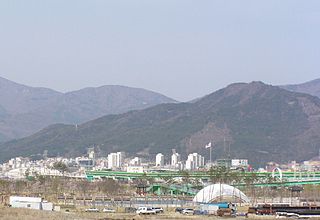
Yangsan is a city in Gyeongsangnam-do Province, South Korea.
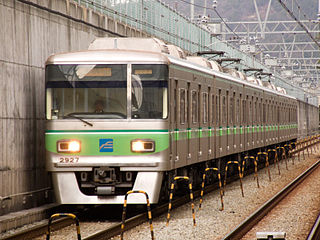
Busan Metro Line 2 is a line of the Busan Metro that crosses Busan, South Korea, from east to west, running along the shores of Haeundae and Gwanganli, and then north toward Yangsan. It is represented by a green colour. It has the highest ratio of subterranean stations to elevated stations, with only its last six being elevated and the first 37 being subterranean. The line is 45.6 km (28.3 mi) long with 44 stations, and its trains have six cars each.

Busan Metro Line 3 is a line of the Busan Metro system. It was built from 1997 to 2005 and opened on November 28, 2005. The line is 18.3 kilometers (11.4 mi) long, and has 17 stations, and its main colour is brown. Each train of the line has 4 cars. Line 3's trains have an open gangway between each car, giving an unblocked view of the whole train from one end to the other. The line was originally planned to have a main line from Suyeong station to Daejeo station with a second phase that splits from Minam Station. However, the second phase split into a separate line and is now called Line 4.
Hwamyeong (Korean: 화명) is a region in Buk-gu, northern Busan, South Korea. It is situated along the east bank of the Nakdong River, and since 2003 has been divided into three dong, Hwamyeong 1, 2, and 3-dong. The total area of the three dong is approximately 12 km2 (5 sq mi). It was designed to serve as a commuter town for Busan, and was home to about 99,000 people as of February 2020.

The Busan Metro is the urban rail system operated by the Busan Transportation Corporation of Busan, South Korea. The metro network first opened in 1985 with seventeen stations, making Busan the second city in South Korea and third in the Korean Peninsula to have a metro system. The Metro itself consists of 4 numbered lines, covering 116.5 kilometres (72.4 mi) of route and serving 114 stations. Including the BGL and the Donghae Line, the network covers 205.6 kilometres (127.8 mi) of route and serving 158 stations.

Korea New Network (KNN) is the biggest regional free-to-air commercial broadcasting station based in Centum City, a high-tech media development complex within Haeundae in Busan, South Korea. KNN is affiliated with SBS. It was originally founded in April 1994 as Pusan Broadcasting Corporation (PSB). It had first begun its demo transmissions upon its establishment in April, and later on September 7 the same year it had begun its test transmissions, and then commenced its official broadcasts on May 14, 1995. As of 2011 its own programs make up to 35 percent of all programs.

Japan participated in the 2002 Asian Games held in Busan, South Korea from September 29, 2002 to October 14, 2002. This country was ranked 3rd with 44 gold medals, 74 silver medals and 72 bronze medals with a total of 190 medals to secure its third spot in the medal tally.
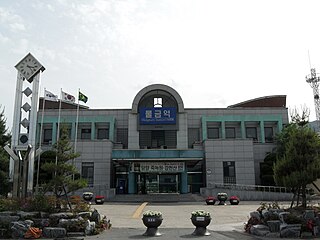
Mulgeum station is a railway station on the Gyeongbu Line located in Mulgeum-ri, Mulgeum-eup, Yangsan-si, Gyeongsangnam-do, Korea. It is the starting point of the Yangsan Line.

India competed at the 2002 Asian Games held in Busan, South Korea. India was ranked 8th with 10 gold medals. Sunita Rani's gold and bronze medals, which she won in the women's 1,500 m and 5,000 m was reinstated after she appealed in the dope scam. India moved up to the seventh spot from the previous eighth spot in the medals table.

Pakistan participated in the 2002 Asian Games in Busan, South Korea held from September 29 to October 14, 2002.

Hopo Station is a station on the Busan Metro Line 2 located in Dong-myeon, Yangsan, South Gyeongsang.
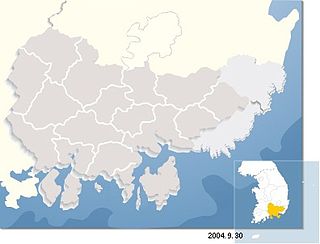
Busan–Gyeongnam Area, also known as Pusan–Kyŏngnam (PK) is the metropolitan area of Busan, Ulsan, and Gyeongsangnam-do (Gyeongnam) located in southeast South Korea.

Pusan National University Yangsan Campus Station is a station on the Busan Metro Line 2 in Mulgeum-eup, Yangsan, South Gyeongsang, South Korea.

Namyangsan Station is a station on the Busan Metro Line 2 in Mulgeum-eup, Yangsan, South Gyeongsang, South Korea.
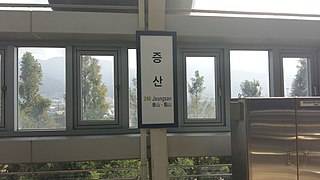
Jeungsan Station is a station on the Busan Metro Line 2 in Mulgeum-eup, Yangsan, South Gyeongsang, South Korea.
The men's football tournament at the 2002 Asian Games was held from 27 September to Saturday 13 October 2002 in Busan, South Korea.
The women's football tournament at the 2002 Asian Games was held from 2 October to 11 October 2002 in Busan, South Korea.
Yangsan Sports Complex station is an under-construction railway station on Busan Metro Line 2 and Yangsan Metro of the Busan Metro system.
Yangsan Metro is an under construction rubber-tyred metro line connecting Nopo station in Nopo-dong, Geumjeong District, Busan and Bukjeong station in Bukjeong-dong, Yangsan, South Gyeongsang Province, South Korea. Originally, it was promoted as the Nopo-Bukjeong line.















